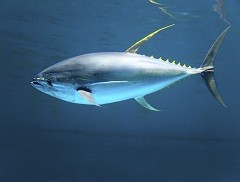On this page

New Zealand’s efforts internationally focus on developing standards, guidelines and measures that promote sound fisheries management, strengthening governance of fisheries resources, and improving the recognition and rights of coastal states.
New Zealand is particularly active in fisheries management, development and compliance activities in the Pacific region. This is in light of our domestic interests and the significance of fisheries resources, particularly tuna, to the economic development aspirations of Pacific Island countries.
As some fish stocks (such as tuna) traverse great distances across different EEZs and into the high seas, genuine cooperation between countries is essential to the long-term sustainability of fish stocks.
International fisheries governance
UN Convention on the Law of the Sea (UNCLOS)
UNCLOS sets out a structure for fisheries governance internationally:
- It distinguishes between the fisheries within the 200 nautical mile EEZ (which are managed by coastal states) and fisheries on the high seas outside the EEZ.
- It has special provisions for fish that travel widely between the different EEZs and high seas (such as tuna), fish that straddle the EEZs and the high seas, and fish that migrate between the sea and freshwater (such as eels and salmon).
- It requires countries to cooperate with one another to conserve and manage fish in the high seas.
UN Fish Stocks Agreement
This agreement aims to improve the cooperative management of fisheries resources. It provides more detail than UNCLOS about how countries should manage highly migratory and straddling stocks in cooperation with each other, and gives particular importance to the role of regional fisheries management organisations (RFMOs). New Zealand ratified the agreement in 2001.
Regional Fisheries Management Organisations (RFMOs)
RFMOs are international organisations formed by countries with fishery interests. These organisations may be focused on the sustainable management of all fishery resources within a specific area, or focused on a particular species.
New Zealand is a member of three RFMOs:
Commission for the Conservation of Southern Bluefin Tuna (CCSBT)
New Zealand, Australia and Japan are the founding members of the CCSBT. It was established to curb over-fishing of the southern bluefin tuna, which is particularly prized by the Japanese sashimi market.
Read more about the CCSBT(external link)
Western and Central Pacific Fisheries Commission (WCPFC)
The WCPFC is responsible for highly migratory fish stocks in the Western and Central Pacific Ocean – a region covering more than 20% of the earth’s surface - and its main focus is the tuna fishery. We regard this as an important forum for representing New Zealand's interests in Pacific fisheries, and to promote the sustainable management of fisheries and the economic benefits these bring throughout the Pacific.
Read more about the WCPFC(external link)
South Pacific Regional Fisheries Management Organisation (SPRFMO)
The SPRFMO was established in 2012 with significant input from New Zealand. It's responsible for non-highly migratory fish stocks in the South Pacific Ocean, covering the area from New Zealand and Australia across to South America. Currently its work is mostly focused on the orange roughy and jack mackerel fisheries.
The SPRFMO’s Secretariat is the first, and so far only, international organisation to have its headquarters in New Zealand.
Read more about SPRFMO(external link)
Fighting illegal fishing
Illegal, unregulated and unreported (IUU) fishing undermines efforts to maintain sufficient fish-stocks. It risks the livelihoods of legitimate fishers, threatens the long-term sustainability of fisheries and jeopardises the reliability of scientific stock assessments.
New Zealand actively opposes IUU. We're engaged in a wide range of efforts to strengthen and improve fisheries governance frameworks and to counter IUU fishing through organisations such as the Pacific Islands Forum Fisheries Agency and the UN Food and Agriculture Organisation (FAO).
We support monitoring, control and surveillance (MCS) by:
- providing training and capacity development to Pacific island countries
- participating in MCS operations, including air and surface patrols in the Pacific and Southern Oceans.
Agreement on Port State Measures
In 2014, we became the ninth country to ratify the FAO's Agreement on Port State Measures to Prevent, Deter and Eliminate IUU Fishing.
This agreement entered into force on 5 June 2016 and aims to prevent illegally caught fish from entering international markets through ports. It allows countries to conduct regular inspections of foreign vessels, and to deny vessels involved in IUU fishing from using ports or having access to specific services. When combined with catch documentation schemes, these measures makes it difficult for ports to process and market fish that’s caught illegally.
The agreement relies heavily on the RFMOs - cooperation within and between regions is essential to its success. Twenty-five countries need to ratify, accept or approve the agreement before it comes into force.
Find out more about the Port State Measures(external link)
The Niue Treaty
This treaty is an important initiative against IUU fishing in the Pacific region. It aims to foster regional cooperation in fisheries legislation, surveillance and law enforcement. New Zealand ratified the Niue Treaty on 16 August 2005.

